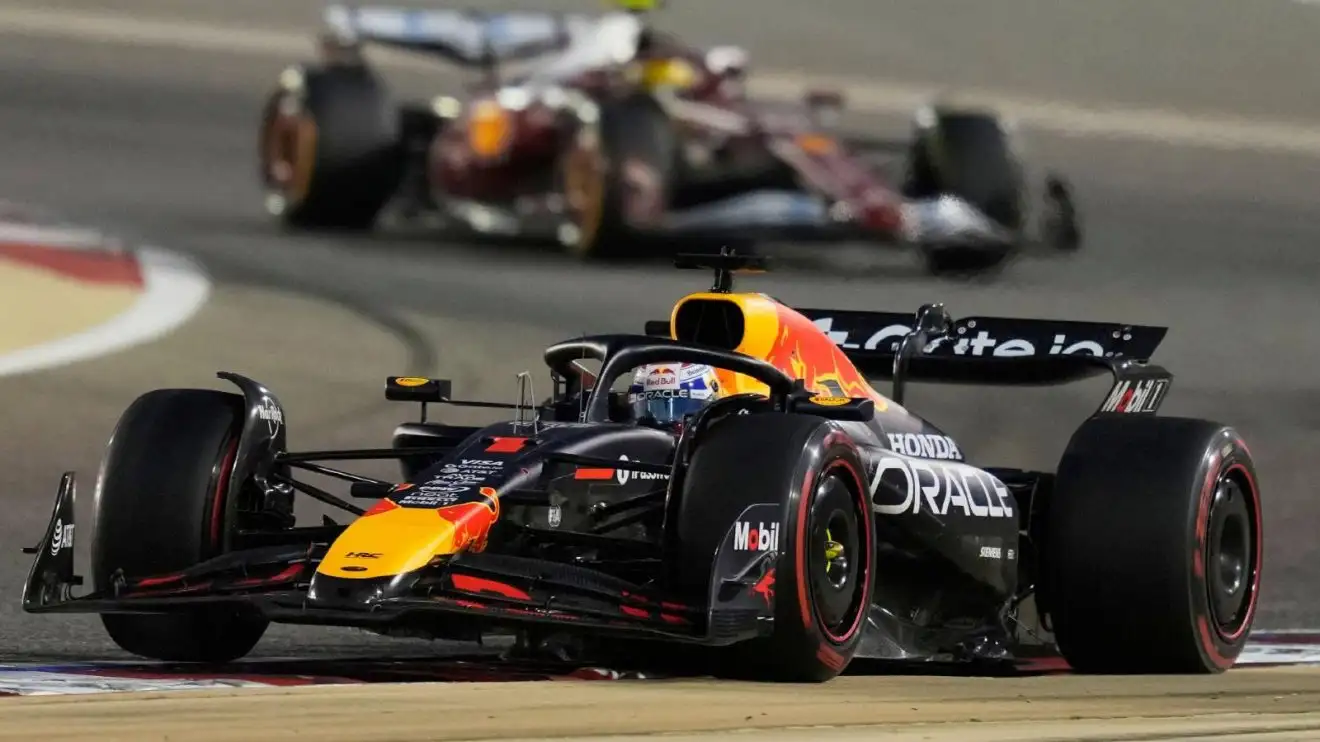Explained: Why were Red Bull’s pitstops so slow in Bahrain?
13 Apr 2025 8:44 PM

Red Bull suffered a systems failure that resulted in lengthy pitstops in Bahrain.
Red Bull suffered some unusually slow pitstops during the Bahrain Grand Prix, which Christian Horner has explained.
Both of Max Verstappen’s pitstops were longer than usual in Bahrain, costing the Dutch driver significant time during the race.
Christian Horner explains ‘wiring issue’ as cause behind Red Bull stops
Verstappen’s first pitstop during the Bahrain Grand Prix, swapping from softs to hards, was over four seconds as the Dutch driver waited for the signal to change to release him – a signal which didn’t come.
Moments later, Yuki Tsunoda suffered a similarly slow stop, with the yellow middle light flashing along with the red light for the Japanese driver, who flagged the issue over team radio.
A second stop for Verstappen on Lap 26 was even slower, with the Dutch driver stationary for 6.2 seconds as he also suffered a slightly sticky right-front wheel.
With Verstappen finishing sixth as the pitstop deficits ended up being somewhat negated by a mid-race Safety Car, Red Bull team boss Christian Horner shed some light on the problems after the chequered flag.
“We’ve had a horrible day where we had [what looks] like a wiring loom issue in the pit gantry, which has caused there to be a problem with the traffic light,” he told media, including PlanetF1.com.
“To actually come away with a sixth place and limit it to an eight-point deficit to Lando [Norris] with the challenges that we’ve had, we need to leave here obviously focusing on what we can sort out for Jeddah in five days time.”
As for whether the issue was procedural or entirely a physical technical fault, Horner said it requires some further analysis.
“I’ve just heard that there was some kind of wiring or electrical issue with the gantry,” he said.
“It’s one I certainly haven’t seen before where, I mean, the drivers live by those traffic lights, and the actual stops were pretty good. They were two seconds.
“It was a two-second stop, but then the drivers waiting for the lights, and then obviously, it didn’t go out. So everything’s gone into quarantine, and we’ll have a good look at it.”
Realising that there was an issue beyond the usual, Horner said the initial suspicion had been literal finger trouble on the part of a mechanic, only for the picture to become clearer almost immediately.
“At the first stop, Max came in and the light in the thing… It’s a very simple system and we expected that, maybe, the button hadn’t been pressed hard enough by one of the technicians,” he said.
“The next pit stop was within one minute. And then it happened again, and at that point, we went into a manual override on the system with the chief mechanic.”
With Verstappen’s race more undone by his RB21 suffering from brake issues and a lack of balance and confidence, he said the stops had not been up to Red Bull’s usual excellence.
“Not good, of course, waiting for so long and [with] two separate problems so [it was] not to our standards,” he said.
Asked by PlanetF1.com whether the pace issues or the operational errors are the bigger problems in his eyes, he said, “The big problem is the pace that we have, basically tyre management and balance. Those are my main problems.”
While the pitstops didn’t aid Verstappen’s quest to move forward from his seventh-place grid slot, the fundamental lack of balance and worse tyre management compared to the team’s immediate rivals meant that his eventual sixth-place was the maximum result he could manage.
“The pace was very bad. But I didn’t expect the race that I had, because, basically, everything went wrong what could go wrong,” he said.
“That probably made it a little bit worse. But I think the position where I finished is, at the end of the day, the maximum that we could have done.”
Having struggled with his brakes on Saturday, Red Bull were allowed to change the friction material for Sunday’s race, a switch that made the brakes “a little better”, according to Verstappen, but “the problem is not only the feeling in the brakes, which is still not where I want it to be, but also our tyres are just overheating.
“So, when I’m braking, there is no feeling because it’s super easy to lock fronts or rears at the same time.”
Read Next: Plank wear results in DQ for second Formula 1 weekend
Max Verstappen
Yuki Tsunoda